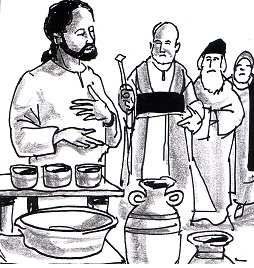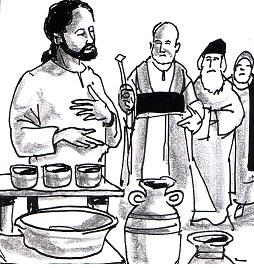

“The one who does justice will live in the presence of the Lord” (Psalm 15:2).
Twenty-Second Sunday in Ordinary Time
Dt 4:1-2, 6-8; Ps 15; Jas 1:17-18, 21b-22, 27; Mk 7:1-8, 14-15, 21-23
When as children we were called in from play to eat, the first question we were asked was, “Did you wash your hands?” My mother expected good hygiene, but, looking back these many years, she was also inculcating in us a whole culture of good habits and order necessary in a family. Making up our beds, putting toys away, brushing our teeth and being on time helped shape our attitudes about being accountable to others. This went along with my father’s insistence on courtesy, addressing adults with their proper titles, “yes, sir,” “yes, ma’m” and always saying “please” and “thank you.”
Religious tradition has always underwritten and reinforced this culture. Muslims and Jews practice regular times of prayer, ritual hand washing, bows and gestures that orient their lives to God. In today’s Gospel, when Jesus responds to criticism of his disciples for eating without first performing ritual handwashing, he was not discounting the practice as such. He was addressing the larger issue of taking these cultural practices to obsessive levels while ignoring deeper concern for genuine purity of life and interior cleanliness.
The story contrasts Jesus’ critics, who are legal professionals in clerical robes who spend their time poring over scrolls and debating the Law in scholarly circles, and his own disciples, rough-hewn, laymen smelling of boats, rope and fish, attacked for not washing their hands before meals. The Gospels sharpen these controversy stories by adding suspect motives to Jesus’ enemies, who attack Jesus indirectly through his disciples. They care less about unwashed fishermen than about faulting Jesus for ignoring the traditions and breaking the Law. They are intent on bringing Jesus down and destroying him because he is a threat to their authority.
Jesus focuses on the real issue: Purity of heart is the goal of religious formation, and it is hypocritical to fuss over human-made rules when so-called models of righteousness are letter-perfect but lack genuine virtue. Evil lurks in the hearts of men, not in what enters the body as food, passing through the digestive tract and into the drain. What does love have to do with this obsession over showtime rather than interior goodness?
Jesus’ response makes this distinction clear. It is better to be good than to look good or to worry about correct social norms that are not informed by love. This includes being alert to the often unconscious prejudice against those who are not keeping up appearances or all the commercial and culture-driven norms for cleanliness, clothing and social acceptability that require products that guarantee germ- and odor-free perfection. LIke the uncouth disciples Jeus defends, these proverbial unwashed poor will always be with us, often without work or doing essential jobs no one wants at low wages, wearing thrift store apparel and living next to toxic industrial parks at the margins of our worlds and our consciences.
The Letter of James sets Jesus’ priorities in full view in today’s second reading: “Be doers of the word and not hearers only, deluding yourselves. Religion that is pure and undefiled before God and the Father is this:to care for orphans and widows in their affliction and to keep oneself unstained by the world” (1:27).
Advertisement








